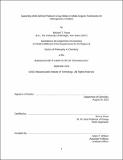Supporting Well-Defined Platinum Group Metals in Metal-Organic Frameworks for Heterogeneous Catalysis
Author(s)
Payne, Michael T.
DownloadThesis PDF (3.892Mb)
Advisor
Dincă, Mircea
Terms of use
Metadata
Show full item recordAbstract
For the many chemical industrial processes which require highly selective transformations, homogeneous catalysts are paramount. The effectiveness of molecular organometallic catalysts in particular can be largely attributed to the precise tools available for synthesis and characterization of the ligands and metal complexes, which allow for fine control over electronics and sterics to optimize substrate binding, reaction kinetics, and catalyst stability. Platinum group metals (PGMs; Ru, Os, Rh, Ir, Pd, Pt) enjoy special distinction among transition metal catalysts `for their high selectivity and activity for a number of reactions of interest such as cross-coupling, oligomerization, and hydrofunctionalization. Such homogeneous catalysts still find widespread application at the industrial scale, but the steep cost of these metals places stringent requirements on homogeneous systems for metal recovery. Heterogenization of PGMs thus poses a substantial benefit by enabling efficient catalyst reuse, but it remains a challenge to translate the well-defined nature of molecular catalysts (and thus their high selectivity/activity) to a solid support.
In this thesis, I describe the development of methodologies for producing well-defined single-site PGM catalysts on a solid support using metal-organic frameworks (MOFs). MOFs are attractive platforms for the heterogenization of PGM catalysts because, in addition to high porosity and crystallinity, MOFs are structurally tunable at the molecular level, allowing fine synthetic control over active sites and their local environments. Chapter 2 of this thesis describes the development of complementary methodologies for generating well-defined PGM scorpionates on a MOF composed of Tpm-based linkers. Detailed structural studies of Pd(II) installed in the C₃ᵥ scorpionate sites reveals an unusually Pd(II)-Napical interaction between the bidentate Pd complex and the third uncoordinated pyrazole arm of the ligand (Pd-Napical = 2.501 ± 0.067 Å). Chapter 3 describes a new synthetic strategy, termed “tetrazine click-grafting”, which enables facile post-synthetic installation of phosphorus ligands onto MOFs. Lastly, Chapter 4 reports the catalysis of MOF-supported Rh phosphines prepared via tetrazine click-grafting for the hydroformylation of vinylsilanes and simple alkenes, with remarkable selectivity for linear aldehydes.
Date issued
2022-09Department
Massachusetts Institute of Technology. Department of ChemistryPublisher
Massachusetts Institute of Technology